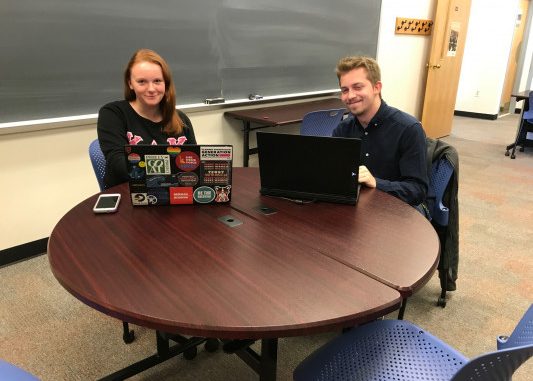
As of January 29th, Ursinus’ Center for Writing and Speaking is open for the Spring 2024 semester. The Center supports students in all aspects of written and spoken communication, doing so through one-on-one appointments with extensively trained Writing Fellows. Writing Fellows spend a whole semester learning and practicing for the position in a required course called “Writing, Pedagogy, and Society.” While it may seem like just a job on campus, being a Writing Fellow is much more than that. It is an experience, one that is unique and rewarding in every way.
Through their working experience, Writing Fellows provide support for other students, but they also learn from the students that they are helping. Every appointment is a learning opportunity for both the student and the Writing Fellow. According to Cici Chagnon ’25, “Working as a Writing Fellow has totally changed the way I look at my own writing. Working with people with all different writing styles has helped me push myself to look at writing assignments differently and to experiment more with my own style.” Appointments in the Center for Writing and Speaking provide opportunities for academic growth but also for personal growth. Chagnon says, “To me, being a Writing Fellow means having the opportunity to make connections with people I might not have met otherwise, while also being a resource that people can feel comfortable reaching out to.” Appointments in the Center for Writing and Speaking create a space for valuable conversations to take place, with Writing Fellows and students building connections based on their similarities and learning about new perspectives through their differences.
It is common for students who have never visited the Center to view appointments with Writing Fellows as intimidating. Students may initially think that it will be uncomfortable to share their writing with a peer, especially if they are not feeling confident in their work. Writing Fellow Evan Chartock ’25 says, “I understand that it can feel like there is a weird power dynamic when a student (who is potentially younger than you) is helping you with your academics. I can assure you that in these sessions, students are surprisingly the ones with the power and autonomy over their own words.” He asserts that “Writing Fellows are simply there to guide everyone towards greatness.” Chagnon encourages students to come to the Center, saying, “It’s not as scary as it might seem! I had to use the Center for a class I took my freshman year and the idea of having to show my writing to someone I didn’t know was intimidating, but my Writing Fellow was super nice and helpful. I wish I had gone to the Center more in my first year.”
Even more than being trained and prepared, Writing Fellows are excited and enthusiastic about having the opportunity to help and support other students. After just recently completing their training for the position, a handful of new students have joined the Center’s team of Writing Fellows this semester. One of the new Writing Fellows, Luke Peloquin ’26, is very enthusiastic about getting to help students in the same ways that other Writing Fellows have helped him. He says, “I take most of my essays to the Writing Center before I turn them in, because it’s so helpful to have another set of eyes on my writing, and I’m excited to pay that forward!” Through his training, Peloquin says that one of the most important things that he has learned is that being a Writing Fellow is not just about writing. “I thought that training would be grammar-and-mechanics centered, but it was mostly about connection, support, and the dissolution of barriers,” explains Peloquin.
Even from an outside perspective, it is evident that being a Writing Fellow is a special experience. Within the first two weeks of arriving at Ursinus during his freshman year, Chartock knew that he wanted to be a Writing Fellow. He worked incredibly hard to make connections with faculty and staff in hopes of being nominated. He spent hours on the application process and wore a suit to his interview. Chartock says, “Being a Writing Fellow is a reminder that I am a driven and determined individual who is passionate about writing and speaking, and I hope to bestow these feelings onto all of my clients.”
Chartock asserts that “the Writing Center is a wonderful environment to work in, and much of that is because of our incredible boss, Dr. Talia Argondezzi.” With Dr. Argondezzi’s leadership and the dedicated work of every Writing Fellow, the Center for Writing and Speaking is not just an academic resource, but is a supportive community, providing help and encouragement for every student to become a better writer and speaker.
